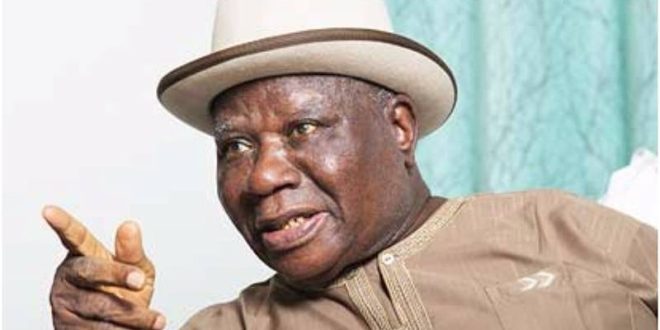Olatunde Oluwasola
FORMER Federal Commissioner for Information and South- South Leader, Pa Edwin Clark has accused many state governors of using the position to amass wealth overnight to the extent of being wealthier than their states.
He also accused them of spending their security votes without accountability.

Clark, who stated these in his 688-page autobiography titled: “Brutally Frank,” regretted that corruption has being the undoing of Nigeria.
The 25-chapter book, which was launched in Abuja, last Thursday, revolves around Clark’s journey as a classroom teacher, commissioner, Minister, Senator and Nationalist spanning over 70 years.
In Chapter 23, titled: “Kleptocracy in our society” from Pages 539 to 542, Clark took a swipe at some governors, saying they were nowhere yesterday and have now become so rich and powerful overnight because they were elected as governors.
The elderstatesman also accused President Bola Tinubu and Senate President Godswill Akpabio of introducing what he described as two irresponsible laws when they were governors of Lagos and Akwa Ibom states respectively, adding that Tinubu introduced Ex-Governors’ Life Pension Law while Akpabio introduced Former Governor and Deputy Governor’s Pension Bill 2014.
Clark said: “It is most regrettable and disappointing that corruption has eaten so deep into all facets of the Federal Government to the extent that those we expected to eradicate corruption in their states and the Attorney-General under whom anti-corruption agencies operate, seem to be involved in scandalous practices over the Paris Club loan repayment… Some lawyers bargain with the Governors Forum as to how much they are entitled to in the repayment being made to them by the local government even though it is not possible to follow all the exchanges. Corruption is the greatest tragedy of Nigeria…
“It can rightly be said that the British colonial government was the first to introduce corruption to Nigeria in their scramble for Africa with other European countries after the Berlin Conference of 1884 through the traditional chiefs, who acted as their agents. A typical case which affected my people is the role played by the British colonial government in using a powerful local chief in the Niger-Delta, Dore Numa, to remove other local chiefs from office when they refused to cooperate with the colonial government. A good example is Nana Olomu of Koko Benin River. An expedition war was staged against him in 1892 and he was later deported to Accra in the Gold Coast. This gave the colonial government uninterrupied entry into the interior land.
“Similarly, they used the same Dore Numa against His Royal Highness, Oba Ovonramwen Nogbaisi of Benin Kingdom in 1897. He too was deported but this time to Calabar, where he spent the rest of his life. This gave the British officers room to loot local artefacts and monuments. The looting of artefacts in 1897 was carried out by Capt. Philip, who further sold them to various countries in Europe. It is remarkable that today, a lot of these artefacts sold to Germany are being voluntarily returned by the German government after 124 years.
“The same British government rewarded Dore Numa by making him a Paramount Chief of the Itsekiri people and the political agent of the British.
“This gave him enormous power over others. The British government used him to acquire extensive land in Warri township which was leased to prominent businessmen in the same Warri township. In fact, there was much to be said of British corrupt practices as in the famous 1925 case of Omenta v. Dore Numa – a case which Omenta brought in defence of Agbasa people. Dore Numa had fraudulently leased to the British a portion of Agbasa land. An intelligence report stated that the case went on to Appeal in 1934; whereas, Dore Numa had died in 1932.
“It was expected, based on the foregoing, that this trend of corrupt practices would be handed over to Nigerians when eventually they became part of government.
“There was one of such alleged corruption cases involving the Premier of Eastern Nigeria, Nnamdi Azikiwe, the foremost politician at the time. A Nigerian Tribunal of Enquiry was appointed to enquire into allegations of improper conduct (on the 4th of August, 1956), by the Premier of Eastern Region and certain other persons holding ministerial and other public offices in the Eastern Region of Nigeria. The alleged improper conduct was in connection with the affairs of the African Continental Bank (ACB) Ltd. and other relevant matters with the minutes of evidence taken before the Tribunal by Nigeria.
“A statement was made by the Hon. Premier in the House of Assembly on the 8th of August, 1956 during the debate on a motion to appoint a Judge of the High Court of the United Kingdom and independent persons to serve in a Commission of Enquiry to investigate the relationship of the Hon. Premier with ACB. This enquiry was going on at this particular time when Dr. Nnamdi Azikiwe was the pre-eminent champion for the struggle for Nigeria’s independence. He was indeed very popular all over Nigeria.
As said earlier, Nigerian Governors have enomours powers. But what have they done with these powers? Nothing, except to enrich themselves.
is a pity that Governors who were nowhere yesterday, become so rich and powerful overnight because they were elected Governors. Their powers as governors and the money they have access to allow them to do anything, except that which God has not permitted them to do. In fact, some governors have become so wealthy that they are wealthier than their states. Contracts are awarded at inflated prices and the governor has to take 80% of the project for himself and only 20% goes to the state which he serves. This is illicit and criminal. Governors are now demi-gods because they own almost everything imaginable.
Time to reduce security vote
Governors spend their security vote as they will and no one knows how much the security vote amount to. The elected members of the House of Assembly are their nominees and dare not challenge them. I think an inspection should be done to limit the amount of security vote governors and every other person in government are entitled to.
“A situation where governors are driven in a convoy of cars, all the food they eat in the Government House is free, and everything they do in the Government House is at the expense of the masses who live in deplorable conditions (is not acceptable). The communities in their territories do not have access to basic amenities, yet these governors, in spite of the recession that is in this country, are comfortable in the Government Houses they occupy.
“They have not shown their remorse. It is not enough to say “I will earn only half of my salary”; there must be a re-organisation and a restructuring of these Government Houses to reflect the economic situation in the country.
“I recall watching the Senate debate on the 2017 budget on television and what were the Senators debating? In Government Houses, cutlery is bought every year at millions of naira. Then one Senator asked the question: ‘What happened to the cutlery that was bought the previous year or even two years ago?’ Nobody cares about that. This is very unfair and not good enough. A new twist to corruption is the unnecessary laws which governors get their stooges in the State Houses of Assembly to make so as to give them (the governors) life pension. I consider this the height of their recklessness. What they get in terms of benefits in just four years is more than what any ‘faithful’ civil or public servant can get in 30 or 35 years of active service.
“Two examples of such irresponsible laws are: The Life Pension Law introduced by Asiwaju Bola Ahmed Tinubu, former Governor of Lagos State and the former Governor and Deputy Governor’s Pension Bill 2014 introduced by former Governor of Akwa Ibom State, Godswill Obot Akpabio.
“It will be recalled that Asiwaju Bola Tinubu, who was Governor of Lagos State for eight years was the first Governor to introduce this obnoxious pension law prior to leaving office, despite all he had acquired in his eight years as the unchallenged Governor of Lagos State.
It will be necessary to reproduce the full text of the law, which gave Tinubu, free houses in Lagos and Abuja. In fact, his house on Bourdillon Street, Ikoyi is indeed a good example.
(The Vanguard)
 National Telescope national telescope newspaper
National Telescope national telescope newspaper



